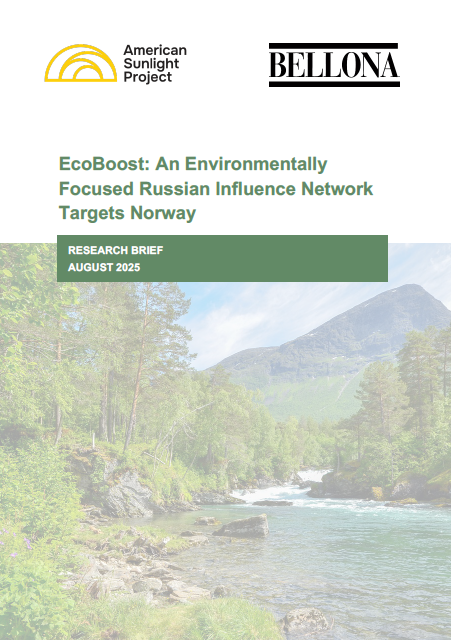
EcoBoost: An Environmentally Focused Russian Influence Network Targets Norway
The American Sunlight Project and the Bellona Foundation show in this brief how the Russian bot network EcoBoost systematically manipulates climate a...
Publication

Publication
The development of a cross-border hydrogen infrastructure within the EU is an opportunity to build a sustainable and fit-for-purpose hydrogen economy. The selection of PCI (Projects of Common Interest) and PMI (Projects of Mutual Interest) for hydrogen infrastructure and electrolysers expected to contribute to market integration, security of supply and sustainability is a key element of this undertaking. Therefore, the selection must be made with the utmost care, as the chosen projects will not only receive strategic and financial support from the EU institutions through funds made available under the Connecting Europe Facility – but receiving PCI or PMI status will also elevate selected projects on a pedestal, increasing their attractiveness to other investors.
Bellona welcomes the opportunity to provide feedback on the selection of PCI and PMI candidates for hydrogen infrastructure and electrolysers within the TEN-E framework. Based on our consultation response on hydrogen infrastructure needs, we chose to comment on the projects proposed in Germany as the host country. This is due to our dedicated workstream on the German energy transition and hydrogen landscape, as well as the country’s high ambitions to develop 10 GW of electrolyser capacity in 2030. Given the current uncertainties surrounding the adoption of the delegated act on RFNBOs, we believe it is particularly important to showcase the potentially adverse effects of large-scale hydrogen production on a rather carbon-intensive electricity grid such as Germany’s.
Overall, PCI and PMI status should always be granted in consideration of the wider contribution to the decarbonisation of the entire system and not just to foster the development of a hydrogen economy. Bellona, thus, considers only a targeted hydrogen use accompanied by a no-regret and fit-for-purpose infrastructure to be in our common European interest and worthy of PCI/PMI status and public funds. To assess those no-regret hydrogen corridors, it is crucial to approach planning from a systems perspective and with a view to maximise efficiency and decarbonisation of the overall energy system.
Our consultation response is structured along several key issues identified, namely infrastructure conversion, ammonia imports and geological hydrogen storage, domestic blue hydrogen production and electrolyser facilities. While our evaluation is limited to projects hosted in Germany, we consider our feedback to be relevant and applicable beyond German borders.
Overall, we find that most projects did not provide clear enough climate safeguards to be granted PMI/PCI status and would at the very least require further investigation and clarification. However, we were pleased that some projects explicitly mentioned the use of additional renewable energy to power electrolysers and aimed at a targeted use of hydrogen in no-regret industrial applications.
Read our Consultation Response: